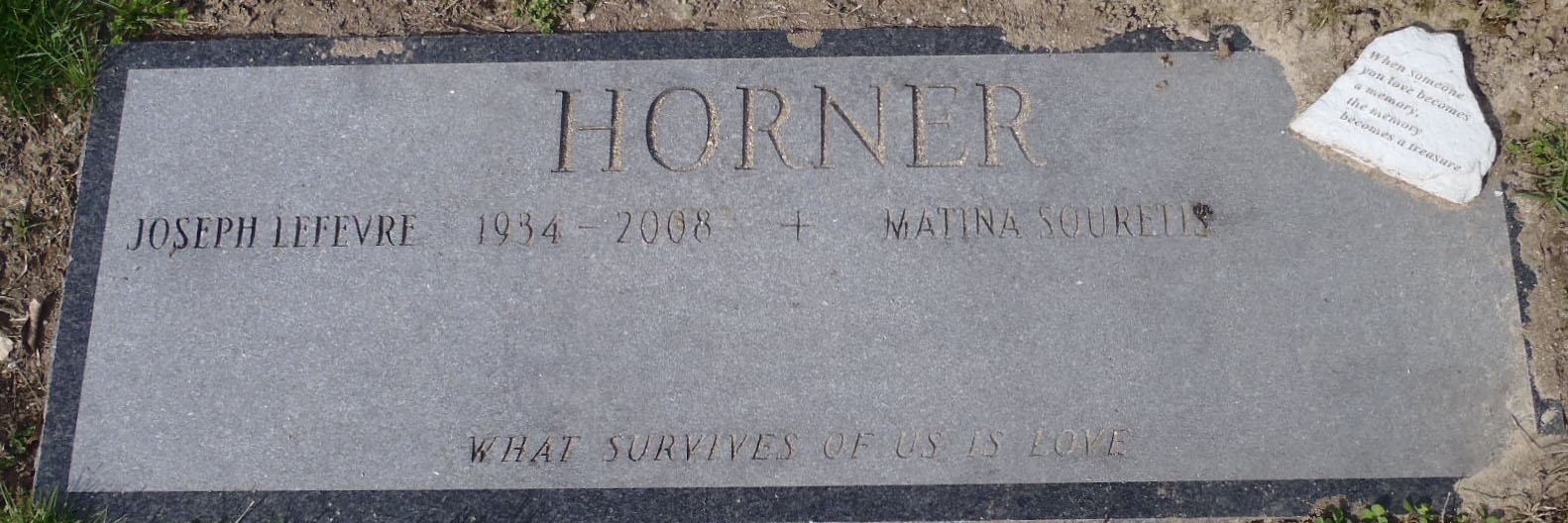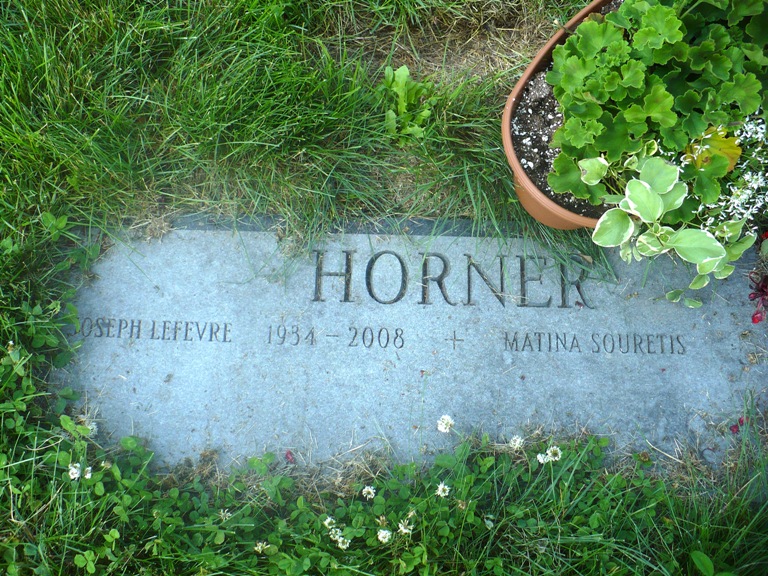By Bryan Marquard
Globe Staff / March 26, 2008
After a long day of inventing at the office, Joseph Horner would pull on the old blue beret he had worn since he was a teenager, head to his workshop in the basement, and invent some more.
Some evenings, musical gadgets would come to life in his hands. That was not surprising: He knew the ins and outs of four instruments and relaxed by playing chamber music for hours on end.
"As long as I can remember, he was always inventing things," said his daughter, Tia of Belmont. "He would make beautiful furniture and other things, too. He made his own version of The Clapper to turn off appliances and lights before you could buy a Clapper, but sometimes lights would go on and off around the house because it didn't work quite right."
Cheerfully unperturbed, Dr. Horner would simply tinker some more. With youthful energy that never deserted him, he was a research physicist who worked as an inventor by day for Polaroid Corp. and the Air Force and moonlighted as inventor by night just for fun. He died of gall bladder cancer March 7 in his Belmont home.
Dr. Horner was 73 and had defeated one of his sons in a racquetball game a month before he died. His concession to chemotherapy was to trim his tennis schedule, but not by much.
"He was fair-skinned and fair-haired to the end; he never went gray," his daughter said. "He played tennis three times a week and on chemo, two."
While illness prompted him to set aside performing music for most of the past year, Dr. Horner had been a mainstay of community orchestras for years.
From piano to clarinet to violin, he was a multi-instrumentalist by the time he was 15. As an adult, he picked up the viola, as well.
"Playing violin and viola put him more in demand," said David Cohen, a friend and fellow community orchestra musician who is an associate professor at Harvard Medical School.
The two frequently traveled to study music at summer programs, including several times to Interlochen, the renowned arts camp in Michigan.
"He would often play eight hours a day," Cohen said. "He would outlast anybody and play well into the night; he was the last to go to bed. He was that avid, he loved chamber music so much."
Joseph LeFevre Horner grew up in Carlisle, Pa., the second of three children and the only son. He built his own transmitters and receivers and became a ham radio operator. He had a license by the age of 10.
Studying physics, he received a bachelor's from Haverford College, a master's from Bryn Mawr College, and a doctorate from the University of Michigan.Continued...
Dr. Horner first came to Cambridge for a postdoctoral fellowship with the National Aeronautics and Space Administration's offices in Kendall Square and then took a job with Polaroid, where he worked with the company's founder, Edwin H. Land.
He married Matina Souretis 47 years ago. Matina Horner became president of Radcliffe College as Dr. Horner's career took him to Air Force Cambridge Research Laboratories in Bedford.
During his career, Dr. Horner edited two books, published 128 papers, and received 28 patents, his family said. In 1992, he was named inventor of the year by the Inventors Association of New England.
"We all share one trait," Dr. Horner told the Globe in September 1992 while attending a gathering of the Inventors Association at MIT. "We want novelty, and we constantly examine what doesn't work well, in hopes of making improvements."
A few years earlier, he had brought a light-bending device to show at the convention, an invention that was later used in fiber-optic communications systems.
Although his physics expertise was such that he once received the Air Force basic research award, not all his work aspired to that level. More than a dozen years ago, he launched a "Mr. Fix-It" program for the Belmont Council on Aging.
What began as a way to help seniors with tasks such as changing a hard-to-reach light bulb progressed to installing adaptive devices, such as grab bars that are used for stability when entering and exiting a shower. In 2004, Dr. Horner told Peter Hotton, who writes the Globe's "Handyman On Call" column, that he had installed more than 100 grab bars in Belmont.
"One lady once told him, 'Joe, every time I get in the shower I think of you,' " his daughter said. "Then she blushed."
Like many people he met outside work, those whom Dr. Horner helped often did not know he was a physicist who could do a lot more than knock off a few simple repairs around the house.
"He was so modest that I never knew about a lot of his professional accomplishments until the wake," said Cohen, who spent hours at a time practicing and playing music with Dr. Horner. "He never talked about his professional life at all. I imagine a lot of it must have been secret."
Along with their home in Belmont, Dr. Horner and his wife had residences in Cambridge and in Maine, though it was to Belmont he returned after his last hospital visit, when he declined further chemotherapy.
"I asked him about a month ago if he had any regrets looking back," his daughter said. "He didn't skip a beat. He said: 'Absolutely not. I loved what i did.' "
In addition to his wife and daughter, Dr. Horner leaves two sons, John of Somerville and Christopher of Cambridge; a sister, Deborah of Denver; a grandson; and a granddaughter.
Published in the Boston Globe 3/12/08 - 3/14/08
By Bryan Marquard
Globe Staff / March 26, 2008
After a long day of inventing at the office, Joseph Horner would pull on the old blue beret he had worn since he was a teenager, head to his workshop in the basement, and invent some more.
Some evenings, musical gadgets would come to life in his hands. That was not surprising: He knew the ins and outs of four instruments and relaxed by playing chamber music for hours on end.
"As long as I can remember, he was always inventing things," said his daughter, Tia of Belmont. "He would make beautiful furniture and other things, too. He made his own version of The Clapper to turn off appliances and lights before you could buy a Clapper, but sometimes lights would go on and off around the house because it didn't work quite right."
Cheerfully unperturbed, Dr. Horner would simply tinker some more. With youthful energy that never deserted him, he was a research physicist who worked as an inventor by day for Polaroid Corp. and the Air Force and moonlighted as inventor by night just for fun. He died of gall bladder cancer March 7 in his Belmont home.
Dr. Horner was 73 and had defeated one of his sons in a racquetball game a month before he died. His concession to chemotherapy was to trim his tennis schedule, but not by much.
"He was fair-skinned and fair-haired to the end; he never went gray," his daughter said. "He played tennis three times a week and on chemo, two."
While illness prompted him to set aside performing music for most of the past year, Dr. Horner had been a mainstay of community orchestras for years.
From piano to clarinet to violin, he was a multi-instrumentalist by the time he was 15. As an adult, he picked up the viola, as well.
"Playing violin and viola put him more in demand," said David Cohen, a friend and fellow community orchestra musician who is an associate professor at Harvard Medical School.
The two frequently traveled to study music at summer programs, including several times to Interlochen, the renowned arts camp in Michigan.
"He would often play eight hours a day," Cohen said. "He would outlast anybody and play well into the night; he was the last to go to bed. He was that avid, he loved chamber music so much."
Joseph LeFevre Horner grew up in Carlisle, Pa., the second of three children and the only son. He built his own transmitters and receivers and became a ham radio operator. He had a license by the age of 10.
Studying physics, he received a bachelor's from Haverford College, a master's from Bryn Mawr College, and a doctorate from the University of Michigan.Continued...
Dr. Horner first came to Cambridge for a postdoctoral fellowship with the National Aeronautics and Space Administration's offices in Kendall Square and then took a job with Polaroid, where he worked with the company's founder, Edwin H. Land.
He married Matina Souretis 47 years ago. Matina Horner became president of Radcliffe College as Dr. Horner's career took him to Air Force Cambridge Research Laboratories in Bedford.
During his career, Dr. Horner edited two books, published 128 papers, and received 28 patents, his family said. In 1992, he was named inventor of the year by the Inventors Association of New England.
"We all share one trait," Dr. Horner told the Globe in September 1992 while attending a gathering of the Inventors Association at MIT. "We want novelty, and we constantly examine what doesn't work well, in hopes of making improvements."
A few years earlier, he had brought a light-bending device to show at the convention, an invention that was later used in fiber-optic communications systems.
Although his physics expertise was such that he once received the Air Force basic research award, not all his work aspired to that level. More than a dozen years ago, he launched a "Mr. Fix-It" program for the Belmont Council on Aging.
What began as a way to help seniors with tasks such as changing a hard-to-reach light bulb progressed to installing adaptive devices, such as grab bars that are used for stability when entering and exiting a shower. In 2004, Dr. Horner told Peter Hotton, who writes the Globe's "Handyman On Call" column, that he had installed more than 100 grab bars in Belmont.
"One lady once told him, 'Joe, every time I get in the shower I think of you,' " his daughter said. "Then she blushed."
Like many people he met outside work, those whom Dr. Horner helped often did not know he was a physicist who could do a lot more than knock off a few simple repairs around the house.
"He was so modest that I never knew about a lot of his professional accomplishments until the wake," said Cohen, who spent hours at a time practicing and playing music with Dr. Horner. "He never talked about his professional life at all. I imagine a lot of it must have been secret."
Along with their home in Belmont, Dr. Horner and his wife had residences in Cambridge and in Maine, though it was to Belmont he returned after his last hospital visit, when he declined further chemotherapy.
"I asked him about a month ago if he had any regrets looking back," his daughter said. "He didn't skip a beat. He said: 'Absolutely not. I loved what i did.' "
In addition to his wife and daughter, Dr. Horner leaves two sons, John of Somerville and Christopher of Cambridge; a sister, Deborah of Denver; a grandson; and a granddaughter.
Published in the Boston Globe 3/12/08 - 3/14/08
Inscription
HORNER
Joseph LeFevre
1934 - 2008
Matina Souretis
Sponsored by Ancestry
Advertisement
Advertisement



